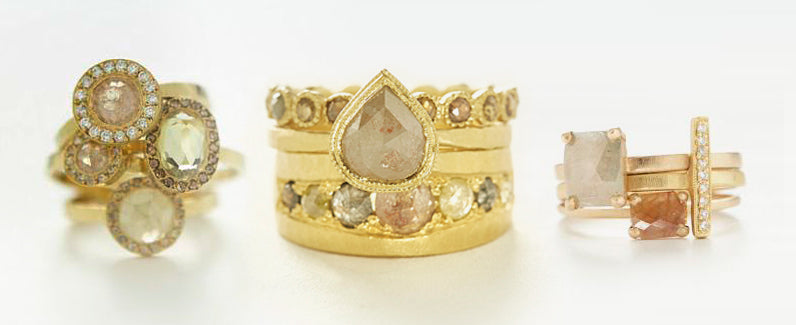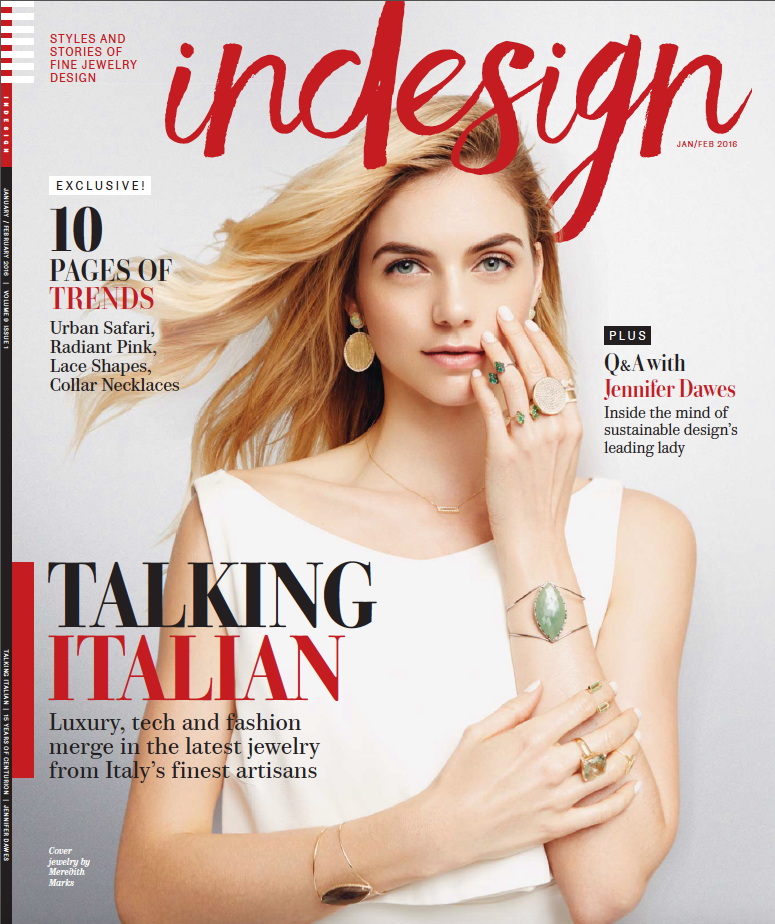Indesign Magazine Jan/Feb 2016
by Trace Shelton |

Jennifer Dawes is known not just for her beautiful, organic jewelry collection, but also for her pioneering business model that produces sustainable jewelry through the use of recycled gold and responsibly-sourced gemstones. Hers is a line that has grown steadily in popularity since its creation in 2000, but especially over the past several years. Her pieces are clean, innovative in a subtle way, feminine but not overly so, and savvy in terms of price point and material. I interviewed her this month for the January-February issue of INDESIGN, but because it was such a great conversation, I wound up with way more than I could fit into two pages. Here are a few bonus Q&A’s with Jennifer:
WHY DID YOU BECOME A JEWELRY DESIGNER?
“I had a transcendental experience when I was 17. I went to an incredible art school in Michigan. One of my first classes was metalsmithing. Within the first hour, I realized what I wanted to do with the rest of my life. I went to college to study metal arts in small scale sculpture. I later had my own architectural metals company. But I always knew I wanted to do jewelry because it’s an intimate and personal art form.”
WHAT PERSONAL MOTIVATIONS INFLUENCE YOUR DESIGNS?
“Making beautiful things. I’m a maker; I have to use my hands. It’s what puts me in a higher state. To be able to challenge myself to make something as beautiful as it can be is my motivation.”
HOW HAS YOUR COLLECTION EVOLVED SINCE YOU BEGAN YOUR BUSINESS IN 2000?
“I started out with a fine art background. My concept with my jewelry was kinetic. Everything was very Germanic – clean lines and parts of the jewelry that moved. As the collection evolved, I started doing stacking rings but still very contemporary-looking and Germanic. But I had an experience in 2005 – I had my first child. That was another transcendental experience. I came to a place where I was really questioning what it is that I do and how does it make the world a better place for this incredible being that I just brought into it. I had a real conflict.”
What ended up happening is I was either going to sell my business and do something different, or change my business to make it resonate and make it feel holistic. I realized I wanted to do ethical jewelry. I started sourcing recycled gold and figuring out where my stones were coming from. This was back when nobody was asking these questions. People in the industry were looking at me like I had three heads. It created a balance in what I do and how I make.
My line from that point forward completely changed. It became more relaxed, more elegant, more ‘from my hand’ if you will. Even if my collections were vastly different, you can tell it all came from the same hands. So it really transformed in 2006 and started to feel more organic.”
WHAT IS INSPIRING YOUR NEXT COLLECTION?
“Right now, I’ve been really inspired by botanicals. I just did a collaboration with Rio Tinto and their ‘Diamonds with a Story’ initiative. I had such a wonderful experience working on a collection for them, and it keeps going forward and metamorphasizing into different concepts in that theme.
I’ve also been doing a lot of three-stone rings and playing with color. I’ve been using a lot of opaque diamonds. There’s a subtlety of color in the stones. If you put a diamond with a greenish hue next to one that’s more pink, the green really pops. But if you put it next to a gray or yellow, it retreats. So I’ve been having a ton of fun. It’s almost doing color theory with opaque diamonds.
I’ve also been working on a lot of geometrics, taking very unusually shaped stones and putting them together into three stone arrangements. I’m in the process of working on a collection where diamonds can be cut into certain shapes. I’ve only ever been able to work with what I could source, but now I’ll be able to order particular cuts. I’m also working with a company called ANZA Gems. Monica Stephenson (of the blog iDazzle) has been working with them and they’re getting material from Africa, having it cut by Roger Dery, and then working with a few designers who are coming up with collections around these stones so that everything’s traceable. Part of the proceeds will go to educate the miners in East Africa. And the material that’s coming out of there is incredible.”




